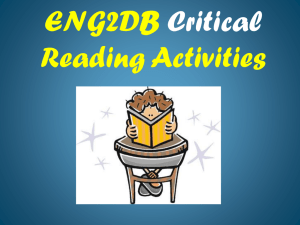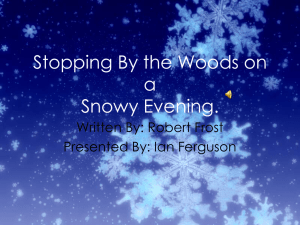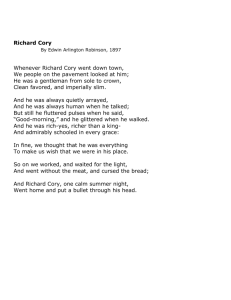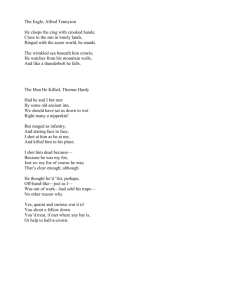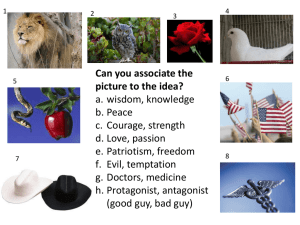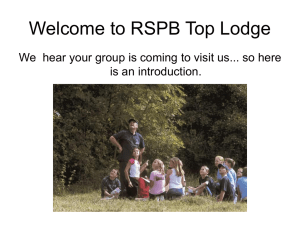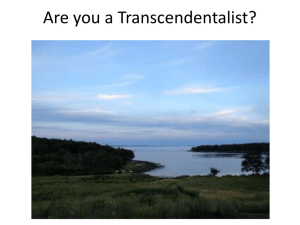Second Sunday in Advent December 4, 2011 10 AM Liturgy
advertisement
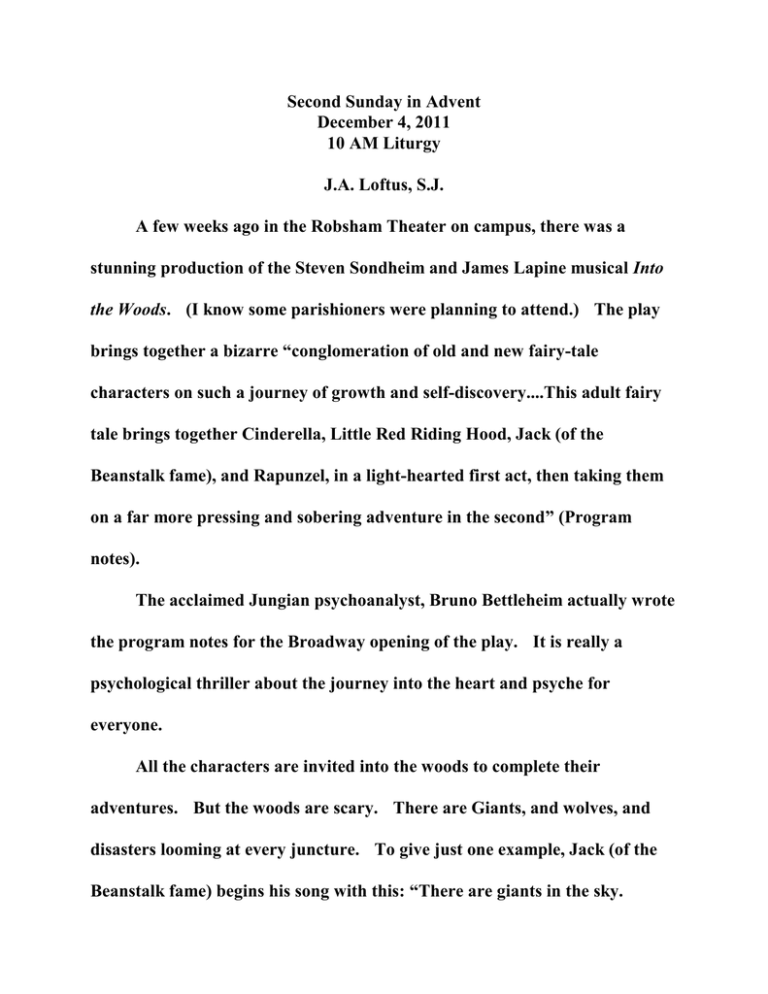
Second Sunday in Advent December 4, 2011 10 AM Liturgy J.A. Loftus, S.J. A few weeks ago in the Robsham Theater on campus, there was a stunning production of the Steven Sondheim and James Lapine musical Into the Woods. (I know some parishioners were planning to attend.) The play brings together a bizarre “conglomeration of old and new fairy-tale characters on such a journey of growth and self-discovery....This adult fairy tale brings together Cinderella, Little Red Riding Hood, Jack (of the Beanstalk fame), and Rapunzel, in a light-hearted first act, then taking them on a far more pressing and sobering adventure in the second” (Program notes). The acclaimed Jungian psychoanalyst, Bruno Bettleheim actually wrote the program notes for the Broadway opening of the play. It is really a psychological thriller about the journey into the heart and psyche for everyone. All the characters are invited into the woods to complete their adventures. But the woods are scary. There are Giants, and wolves, and disasters looming at every juncture. To give just one example, Jack (of the Beanstalk fame) begins his song with this: “There are giants in the sky. There are big tall terrible Giants in the sky.” He is terrified of what he finds when he crosses a “boundary” in the sky, and in himself. But each of the characters, like Jack, finds something in the woods that’s scary, yes, but also nice, and wonderful. At the end of his journey, Jack sings the same song with a significant addition: “There are Giants in the sky. There are big tall terrible, awesome scary, wonderful Giants in the sky.” The invitation into the woods is scary, but wonder-full. And, in any case, it is necessary–for each of them. My brothers and sisters, there is a woods inside and outside of each one of us. And Advent is about exploring that woods. Two of the greatest prophets in our tradition cry out to us today from the wilderness, from the desert, from the woods. And the intent is that today the calm of our lives should be “startled by those voices from the wilderness” (Dianne Bergant). The invitation of Advent is not painted in the soft, glowing pastels that so dominate the upcoming Christmas season; the invitation is painted is stark primary colors that speak of the importance of preparing for the coming of the Lord. It is easy to prepare for the coming celebration of Jesus’ birthday in 2 Bethlehem. Just turn on your radio and listen to the music! It is more of a stretch to prepare for Christ’s second coming when the new heavens and new earth descend to enflesh that longed-for kingdom of justice and peace. But the third coming of Christ, the coming that is here-and-now, the coming that we really need to watch for, and prepare for...that sometimes gets lost in the shuffle of a very busy season. And that coming is what Advent is also about. Isaiah calls for some major highway reconstruction in our psyches and in our hearts. There are valleys to be filled; there are mountains to be leveled; there is rugged land and rough country to be tamed. And it is all inside us. This will be as inconvenient as every major highway project we have ever seen on Route 128. It is not just potholes that need to be filled or curbs that need replacing. What Isaiah calls for is the serious transformation of the landscape of our lives (Dianne Bergant). We might expect the other great prophet, John the Baptist, with his Camel’s hair cloak and his at least mildly bizarre diet to be a man of fewer words. Nothing here for George Friedrich Handel to make music with. And John does not disappoint: repent and be forgiven. That’s it! Sounds depressing for Advent, doesn’t it? It gets worse. Sister Dianne Bergant writing in America magazine extrapolates and 3 fills-in John’s demand. For her, what John is really saying is “Acknowledge your sinfulness, your anger and hatred and desire for revenge, your obsession with power and your manipulation and abuse of others, your greed and your unwillingness to help those in need.” I don’t like to think of myself as even having most of those qualities. Sister Dianne and John the Baptist would like me to reconsider–to reconsider myself and to be willing to really prepare for Christ’s coming today–and tomorrow and tomorrow and tomorrow. This is serious business, this Advent stuff. It is always serious business to go into your very own woods. But in one of the final songs of the play, Sondheim urges us to remember that when we go into those woods, no matter how lonely and frightening it may seem, no one is alone. Little Red Riding Hood has lost both her grandmother and mother in the woods. Cinderella sings to her: “Mother cannot guide you. Now you’re on your own. Only me beside you. Still, you’re not alone. No one is alone, truly. No one is alone. Sometimes people leave you halfway through the wood. Others may deceive you. You decide what’s good. You decide alone. But no one is alone. Mother isn’t here now. Who knows what she’d say. Nothing’s quite so clear now–Feel you’ve lost your way? You are not alone. Believe me. No one is alone.” 4 We wait and watch in Advent for the Christ. But remember: as you wander in the woods today and tomorrow, you are not alone. He is already Emmanuel: God with us. Enjoy the journey inward. Peace! 5
